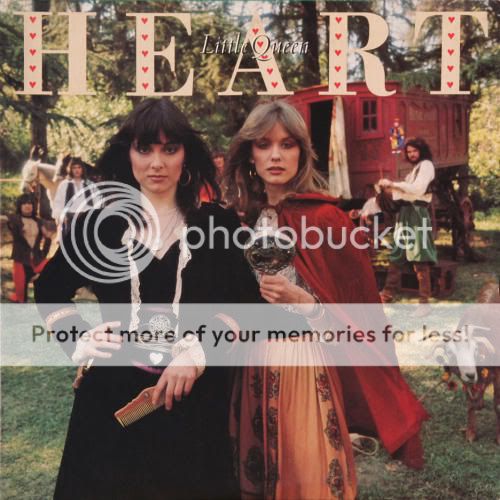It used to be easier to pretend that an album was its own perfectly self-contained artifact. The great records certainly feel that way. But albums are more permeable than solid, their motivations, executions and inspirations informed by, and often stolen from, their peers and forbearers. It all sounds awfully formal, but it's not. It's the very nature of music — of art, even. The Six Degrees features examine the relationships between classic records and five other albums we've deemed related in some way. In some cases these connections are obvious, in others they are tenuous. But, most important to you, all of the records are highly, highly recommended.
Though they had been preceded in the '70s by such all-distaff middling sellers as Fanny and Birtha, Heart were, by any objective standard, the first really popular band to pass muster in their heyday as metal whose main members were women — namely, singer (and frequent multi-instrumentalist) Ann Wilson and her guitar-playing (and occasionally singing) little sister Nancy. The rest of the band was all male, sure, but can you name any off the top of your head? Didn't think so. Awestruck, zitfaced '70s high school Beavises inevitably hornily dubbed them "Led Zeppelin with tits," and critics followed suit: Mikal Gilmore, in the 1979 edition of The Rolling Stone Record Guide, started out, "Take Ian Anderson and Robert Plant, endow them with mammaries, and you have the essence of Heart." Which is both reductive and condescending — on the cover of 1977's Little Queen, the only visible cleavage belongs to the archer on the back. Who happens to be a man.
Which too is significant, as is the cover's entire Renaissance Faire motif where the dudes all look like pretty boys hired to service the ladies. Because one big thing Heart brought to hard rock was a free-flowing, machismo-free brand of lust, perhaps realized most voluptuously in "Crazy on You" and "Magic Man," from their 1975 debut Dreamboat Annie. That record originally came out on the Vancouver indie label Mushroom, which followed it with a pile of half-baked demos called Magazine, not to mention a Rolling Stone ad implying that Ann and Nancy were lesbian bedmates. Which incident, the story goes, inspired the ichthyological teeth-gnashing of "Barracuda," the first and signature song of Little Queen, the first album Heart actually recorded for a major record company. Thirty-one years later, "Barracuda" was appropriated as the theme song of Sarah Palin's vice-presidential campaign, to both the liberal consternation and royalty profit of the band.
Guitarwise and drumwise, "Barracuda" is one of history's great Zep rips ("Immigrant Song" or "Achilles Last Stand" — take your pick), but it's also one of only three truly loud rockers on Little Queen. The others are the concise, speed-freaked "Kick It Out" — an under-three-minute nugget that rarely gets its due — and the longer, more Zep-funked title track. "Say Hello" may well be an anomaly in the band's catalog, given its Brazilian pop-samba rhythm (similar to Paul Simon's "Me And Julio Down By The Schoolyard," and maybe even a far-distant great-aunt of something-or-other by Vampire Weekend), not to mention the audible audio-vérité sandlot baseball game (even some umpire shouting out "batter up!") going on in the background as it begins. The rest of the album is more folk: Celtic jangle, flower-power flutes, proto-New Age atmosphere, madrigal mysticism, even a borderline jazzish Joni Mitchell/Laura Nyro confessional called "Treat Me Well," crooned by Nancy not Ann. If you've got an imagination, you might hear Axl Rose circa Use Your Illusion presaged in parts of "Love Alive" and "Go On Cry"; the even more open-minded might note how Heart's bicentennial concert rendition of "Stairway To Heaven," added as a bonus cut upon the album's 2004 CD reissue, breaks into a "Sweet Home Alabama" rhythm at the end. But either way, "Dream Of The Archer" is clearly about that open-shirted Cupid on the album cover, shooting you with his poison arrow.
Read More
Wednesday, September 22, 2010
Subscribe to:
Post Comments (Atom)







No comments:
Post a Comment